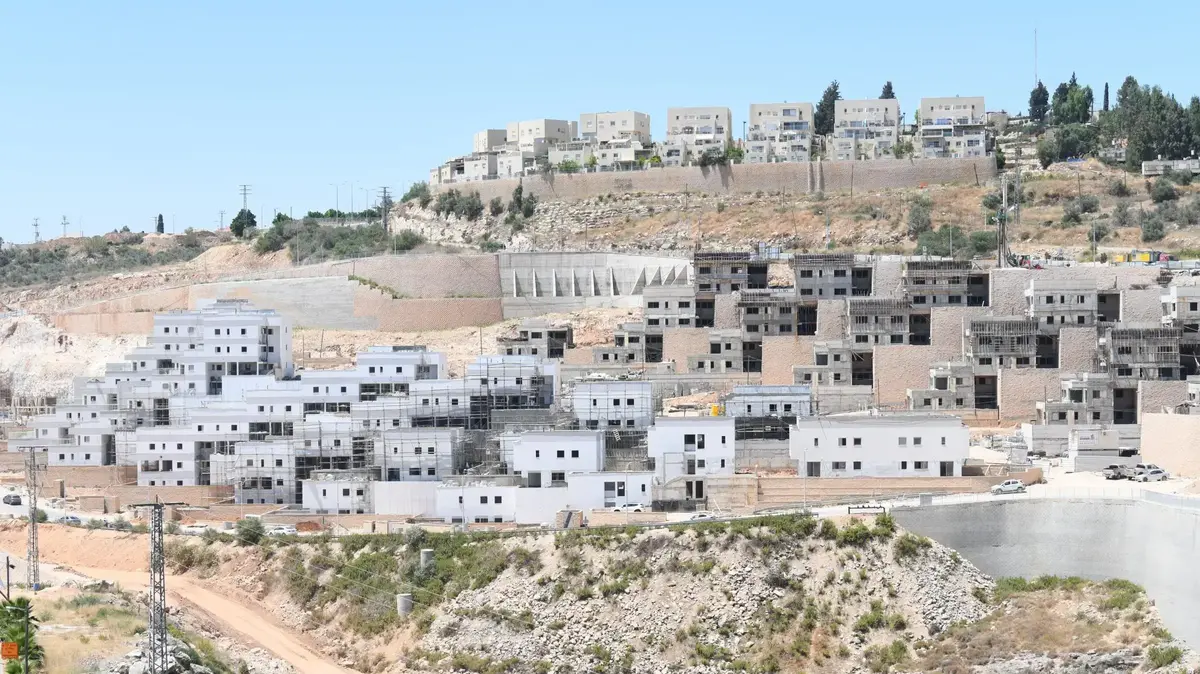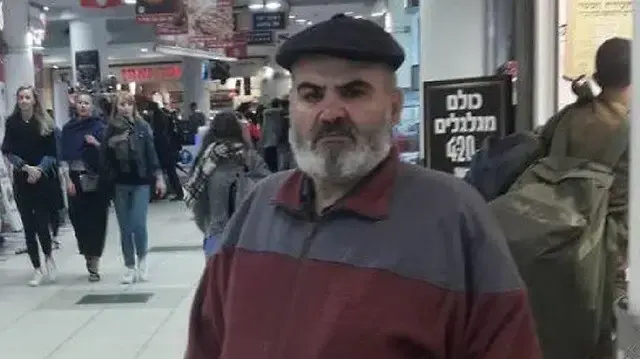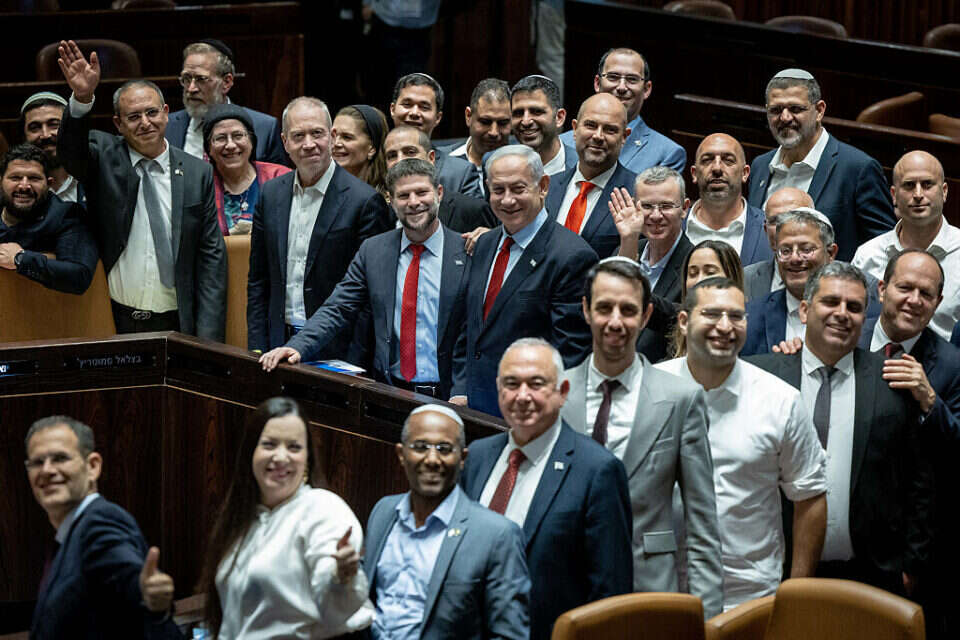On Ayelet Shaked, Yossi Dagan, and the new local council in Samaria
At record speed, despite a report pointing to the problematic nature of the move and its heavy economic price, and to Dagan's satisfaction, Minister Shaked decided to remove from his council the most problematic locality for him electorally, in favor of a new council
Kalman Liebskind
27/05/2022
Friday, 27 May 2022, 06:05 Updated: Saturday, 28 May 2022, 22:23
Share on Facebook
Share on WhatsApp
Share on Twitter
Share on Email
Share on general
Comments
Comments
Too many question marks hover over Interior Minister Ayelet Shaked's decision - a decision made a few weeks ago and passed relatively quietly - to remove the localities of Etz Ephraim and Shaarei Tikva from the Samaria Regional Council and establish a new local council for both.
And why does this decision raise question marks?
Also because of the record speed at which it was received.
Also because it is contrary to the long-standing policy of the Ministry of the Interior, which concerns the unification of authorities and not their splitting.
Also because it is a connection of two localities that are not adjacent to each other and another local council separates them.
And also because a report by a professional committee set up by Shaked, and the main points of which will be revealed here, indicated a major problem during this process, which would cost the country a great deal of money.
Poetry Avitan Cohen pointed out some of these issues about three weeks ago in "Globes".
A decision that raises question marks.
Shaked (Photo: Niv Aharonson)
Who politically benefits from this decision of the Minister of the Interior?
First of all, the head of the Samaria Regional Council, Yossi Dagan.
Dagan, a powerful figure in the Likud, has been on good terms with Shaked for years.
Three years ago, at a public event, he even urged her to run for the Likud.
"The people of Israel need you," he exclaimed.
Dagan, it seems, has been hoping for many years to separate from the two localities in question.
On Shaarei Tikva, the largest locality in Dagan's regional council, it can be said that it is far from being its largest support base.
In the last election, just to demonstrate, Dagan ran against Paul Golubnovsky, an unrecognized candidate who sought to be challenged, who knew his chances of winning an incumbent and powerful councilor like Dagan were nil.
Golubnovsky managed to obtain in all localities of the council an average support of only about 14%.
In Shaarei Tikva, on the other hand, he received almost half of the residents' votes.
The discourse surrounding Dagan's desire to take these two localities off his back has been going on in Samaria for years.
Already in 2017, the initiative arose for one of four localities, including the two in question, in favor of establishing a new city in Samaria.
The Elkana Council, one of the same four localities, then opposed this union and sent an urgent letter to Attorney General Avichai Mandelblit, accusing Dagan of pushing the idea for electoral reasons.
Dagan, it was argued at the time, was in conflict with the residents of Etz Ephraim and Shaarei Tikva and wanted to transfer them to another municipal entity.
"My friends, please do not get confused," Assaf Minzer, then head of the Elkana Council, wrote to his friends, the heads of the local authorities.
"This is an invited and timed campaign led by Yossi Dagan to unite the authorities, all with the aim of getting rid of the residents of Shaarei Tikva and Etz Ephraim due to huge debts between them and the Samaria Council, and out of fear that he will be swallowed up by them in the upcoming elections."
In any case, the process of establishing the new local council, named "Sha'ar Shomron", was conducted at record speed, which is unlikely to have a precedent.
Only last November did Shaked instruct the committee to unite authorities to investigate the issue of splitting the Ephraim tree and Shaarei Tikva from the Samaria Regional Council, and establishing a new local council for them.
Only four months later, and a total of three meetings, the committee completed its work.
Shortly afterwards, Minister Shaked signed the decision and made it a fait accompli.
Anyone who reads the summary document of the committee, headed by Ruth Yosef, a senior senior official in the Interior Ministry, will notice that every line in it shouts against Shaked's move.
Moreover, following the reading of the document, it is very difficult to understand how Shaked chose to ignore what was written in it, so blatantly, and without any justification.
Enjoy the decision.
Dagan (Photo: Reuven Castro)
Minority residents
It starts with the question, why even set up a new local council?
The Local Authorities Ordinance explicitly stipulates that the Minister of the Interior shall not announce the establishment of such a council unless it has ten thousand residents, unless it is a "special circumstance."
For the committee members who examined the issue, it was important to emphasize that "in the past, the Ministry of the Interior has refrained from establishing new localities of less than 10,000 people."
According to data from the Ministry of the Interior, 6,070 people live in Shaarei Tikva.
In the tree of Ephraim 2,626.
And a total of 8,696 people.
In other places where such a move is being considered, the Ministry of the Interior has examined whether there is a possibility of the settlement expanding in the near future.
In Tzur Hadassah, for example, a locality that is being considered at the same time, already has more than ten thousand residents, and in addition there are plans to build 5,700 housing units, about 4,000 of which are already approved, and these will make it an authority with more than 20,000 residents.
The committee tried to examine the possibility that the new council, which would connect the tree of Ephraim and Shaarei Tikva, would soon grow a larger population, and found that this was a completely difficult story.
Although Ephraim Tree has plans to build 1,300 new housing units, these plans have not yet been approved, and the land on which 500 of them are planned to be built has not yet been finally purchased from its owners.
In Shaarei Tikva, there are plans for another 800 housing units, but some of them are located in an area that is currently still outside the settlement's boundaries.
When will the situation change?
No one has an answer.
So much so that it is a towering tower in the air, that the committee bothered to note about these construction plans that "it is worth noting that these are very preliminary procedures, most of them are at conceptual stage or in land acquisition stages, and the date of completion of detailed planning procedures." .
In short, it is not at all clear if and when something can be built there.
More on Walla!
Meretz objected: The government approved the proposal to establish 5 new localities in the Negev
To the full article
Ecological sensitivity and generosity at the expense of others
further.
Will the new council be able to carry itself financially?
Well, according to the report of the committee appointed by Shaked, absolutely not.
On the contrary.
This council is going to cost a lot of money, both to the Ministry of the Interior and to the residents of the Samaria Regional Council.
The committee sought to assess the chances of the new council sustaining economically on its own, and to that end used data it had on similar authorities in nature and number of residents.
"In order to try to predict the future budget structure of the communities of Etz Ephraim and Shaarei Tikva in the short term, if and when they operate as one local council, the committee performed a 'budget simulation' for municipal activities, by changing the definition of type of localities and turning them into a local council," the members wrote.
Pretty.
A good idea.
And what turned out?
"This simulation revealed that as long as it is decided to turn the localities of Etz Ephraim and Shaarei Tikva into a local council, there will be a gap between revenues and the expenses of the new council in the amount of NIS 10 million."
And how will the new council close a deficit of NIS 10 million a year?
Well, the committee calculated and found that 6.7 million it could receive as an annual balancing grant from the Ministry of the Interior, an amount that even after that it would have a built-in annual deficit of 3.3 million.
In conclusion: "As long as it is decided to turn the localities of Etz Ephraim and Shaarei Tikva into a local council, the Ministry of the Interior will be required to transfer to the United Local Council an annual balancing grant or other government support amounting to NIS 10 million per year."
The committee tried to see if it would be possible to bring funds to the new council from the newly planned industrial area nearby.
This is an industrial area whose income, according to an early agreement, is to be divided - for rehabilitation, a matter that will take some more time - between the Samaria Regional Council and the Oranit and Elkana local councils.
The Samaria Regional Council, headed by Dagan, proposed to the committee to transfer to the new council a significant portion of the expected revenue from the new industrial zone.
It is not clear how many residents of Tapuach or Itamar will be happy with this generosity of their council, at their expense, but it does not really matter at this stage, because members of the Interior Ministry committee were not really impressed that salvation would soon come to this industrial area.
"The plan is still expected to have a move of objections, probably from the green bodies, due to the fact that the proposed area is sensitive in ecological aspects," they wrote.
"In both cases," the committee concludes, "both in the matter of residence and in the matter of income from the Samaria Gate (industrial area - KL), these are processes that have not yet been fully mature and their date of implementation is uncertain."
The committee adds, and closes the door on this initiative, for the benefit of those for whom the matter has not been clear so far: ".
And all this before we mention the amazing fact in itself, according to which the new local council established by Shaked connects two localities that are not at all adjacent to each other, with another local council, Elkana, separating the two.
Four committees, by the way, have been convened to discuss this union of authorities in the past.
All of them - in 2001, 2003, 2008 and 2017 - recommended a much broader unification of four localities: the two current ones, and with them also Oranit and Elkana.
The new council will not be able to carry itself financially.
Shaarei Tikva (Photo: Walla! NEWS system, Wikipedia)
Built-in deficit
During the discussions of the Interior Ministry committee, and out of a desire to promote the separation process from Ephraim and Shaarei Tikva, Dagan volunteered to assist the new council from his council's budgets.
The CEO of his council sent an orderly letter announcing the council's willingness to transfer to the new council, among other things, half of the property tax revenues of the new industrial zone, when it is built, and half of the
revenues of a new quarry to be built, when it is built.
The interior that examined the move that the Minister sought to promote, that one of the ways that will help close the deficit with which it will set out on the new council, will pass in the "short term", through "transfer of revenue from the Samaria Regional Council to the new locality." Living in peace with the fact that their money will be transferred to another council?
Either way, in an attempt to convince the committee of how successful the move was, Dagan explained through a financial report presented by his people that the economic situation of his council would only improve after the separation from the two localities.
"The reduction of the localities of Etz Ephraim and Shaarei Tikva will lead to a financial increase in the council's budget of about four million shekels," the committee members cite what was given to them.
Great, right?
However, close to Shaked's decision to establish the new council, and close to Dagan's council's announcement of the financial gain that this move will bring it, Dagan's council sent the relevant government ministries another document, entitled different.
In this document, the Samaria Regional Council explains that it wants to receive a significant budget increase, because the separation from the two localities will result in huge losses for it.
It also lists some of the big losses.
About NIS 34 million in "zero time", ie as soon as the move is launched.
Another NIS 11.5 million in "first year".
In the summary of the document, the professionals of the Ministry of the Interior emphasize quite clearly: "An analysis of the budgetary capacity of the united locality revealed that there is a gap between the expected revenues and the projected expenditures of the united locality. "This amount will question the ability of the new locality to provide an adequate level of services to its residents. Therefore, the committee recommends keeping the existing situation until the locality reaches the threshold of 10,000 residents or more and a source of income is used to close the gap between the new authority's projected expenses and expected income."
Is there a clearer explanation than that?
An annual deficit of NIS 10 million is expected.
Ephraim Tree, June 2020 (Photo: Reuven Castro)
Do not want to open a front in front of a grain or almond
From now on, in the last 15 lines of the dozens-page document, the committee members - under the heading "Alternatively" - leave a narrow, problematic opening in itself, for Sarah.
It is possible to explain, they write, that although the established council does not have the required minimum number of residents, there are "special circumstances".
This is the size of the localities in relation to others in the council, this is the wide area of jurisdiction of the council, which produces large distances between the localities, this is the distance of the two localities from the "core of the council".
But all this, the committee reiterates, will have a price.
If you decide to rely on these "special circumstances", its members explain, the ministry will still have to find a source of income that will allow it to close the "apparent budget gap between its revenues and the new council's expenditures."
How do you find such income?
The committee explains: either through regular grants from the Ministry of the Interior.
Or, "in the short term", through "transfer of income from the Samaria Regional Council to the new settlement".
Or, "long-term," by including the new council in the distribution of revenue from the area's industrial zone, when it arises.
Bottom line, 30 days after this document was signed, raising piles of difficulties and financial question marks over the initiative of this initiative, Shaked launched the new council, as if the committee had said nothing.
"We did not unequivocally recommend the establishment of this council," Moshe Alexelsi, one of the committee members, explained to me this week.
"Both because we had reservations about this council not having ten thousand residents, as is customary, and also because this new body has no economic resources, and it will not be able to stand on its own two feet without the Interior Ministry helping to fund it. With state funding, that could happen."
And one more important point.
I have talked in recent days with several factors that have been involved in settlement for many years.
None of them wanted to be interviewed on his behalf, and open a front in front of Dagan or Shaked.
But the explanation they gave for their opposition to this move, is very important.
The power of settlement lies in the connection of all the settlements in it, into one punch.
Strong and weak localities, large and small localities, richer and less rich localities, localities that are in blocks and localities that are deep in the area.
Detachment of the more powerful ones, especially those located near the Green Line, leaves others more politically and politically vulnerable.
So what are we left with?
With a new local council, established contrary to the recommendations of four committees which had previously thought that if a new authority was already established, it should be much larger and merge into a few more localities;
With a council established at a peak time of four months from the first decision to examine the issue, until the Interior Minister's signature on the approval;
With a new council uniting into it two settlements that are not adjacent to each other, and another local council separating them;
With a move that could hurt settlement;
And with the State of Israel having to fund it with many millions out of pocket.
Ministry of the Interior: There is full agreement of the two local committees.
Ephraim Tree, June 2020 (Photo: Reuven Castro)
Ministry of the Interior: "Substantial need that arose from the field"
Response of the Office of the Minister of the Interior, Ayelet Shaked: "The establishment of the new council in Samaria has been examined several times in the past by various commissions of inquiry under different interior ministers, which positively examined different separation lines. At that time, the recommendation was With the full consent of the Samaria Regional Council and the two local committees, Shaarei Tikva and Etz Ephraim, which was a significant step in the process.
"It should be noted that Shaarei Tikva already exists as a kind of separate locality, with a closed budget basket, in which all municipal services are provided by the local committee. This conduct allowed for a clear property separation between the councils. However, the committee examined the establishment of the council against the background of the Local Councils Ordinance, which allows in special circumstances to declare a local council, even if the number of residents is less than 10,000 as long as it exceeds 5,000. Stands for an addition of about 19,000 residents in the next decade.
"The council was established on the basis of a substantial need that arose from the area.
The two localities, Shaarei Tikva and Etz Ephraim, complained about difficulties in obtaining the municipal service from the Samaria Regional Council in an adequate manner, both due to the size of the localities and due to the extensive geographical distance within the council's area.
"The main goal of the establishment of the new council is to promote settlement in Samaria, while improving the service provided to residents in the new council. To implement the plans and expand settlement in Samaria.
"The committee raised possible economic difficulties for the new council, but the Interior Ministry, in dialogue with the Samaria Regional Council, will formulate an outline for the distribution of income from employment and commercial areas, existing and future.
Also, prior to the decision, the Minister consulted with the Minister of Finance and the Minister of Defense, who expressed support during.
The finance minister has also pledged to allocate resources to the split.
The minister sees great value in establishing a new council in Samaria, a council that can eventually develop to the size of a city. "
"The establishment of cities in the Land of Israel should not be seen as an economic matter only."
Shomron Regional Council Chairman Yossi Dagan (Photo: Nissim Lev)
Dagan: "Ideological and value investment"
The response of the head of the Samaria Regional Council, Yossi Dagan: "The Samaria Regional Council believes that as many cities as possible should be built in Judea and Samaria. Ideologically, in this worldview, settlement is an investment and not an expense
.
In such a view, it might not be profitable to build a city in the Negev called Dimona and it would not be profitable to build a city in Samaria called Ariel.
However, this is not an economic consideration, it is an ideological and value-based investment and it must be examined over decades.
This is what the Samaria Regional Council did for years, when seven localities left the council, and became local councils and one of them became a local council and later the city of Ariel.
"The Samaria Regional Council has done this for years, understanding that the road to a million residents in Samaria, passes through the establishment of new settlements and the transformation of existing settlements into large urban settlements and the way to do so becomes their growth into a local council and then cities." Since the construction of the separation fence has been cut off from the other localities of the Samaria Regional Council, and in all likelihood their size is disproportionate to the Samaria Regional Council), it should be noted that the process of separating the Shaarei Tikva and Etz Ephraim localities from the Samaria Regional Council has been under 25 years. All the interior ministers from all shades of the political spectrum - Avraham Poraz, Eli Yishai, Aryeh Deri and Ayelet Shaked - recommended that the settlements of Shaarei Tikva and Etz Ephraim be removed from the Samaria Regional Council.
"Moreover, all the community committees of Etz Ephraim and Shaarei Tikva for the past 25 years, as well as all the heads of the Samaria Regional Council for their generations, have demanded and sought the separation between the communities. That is, it is an issue "
The
political claim is materially incorrect and substantively unfounded, as the facts are completely opposite: in the localities of Etz Ephraim and Shaarei Tikva, Council Chairman Yossi Dagan won the two election campaigns, both in 2015 and 2018, in two-thirds of the votes (66.2% of the votes in 2015 and -66.15% in 2018).
This result is much higher than in quite a few other localities in the Samaria Regional Council.
Regarding the economic claims: The reporter quotes an excerpt from a 39-page report.
A point section in which the council was asked by the committee to report on the cost of the activity transferred each year, from the Samaria Regional Council to the localities of Shaarei Tikva and Etz Ephraim, for education, welfare and more.
This is to build a budget for the new authority.
There is no preoccupation with all the losses to the council, but with some of them.
Regardless, the council must report to the Treasury on the impact of balance sheets, reorganization, council committee duties and so on due to the union - and so it did.
"Regarding the readiness of the Samaria Regional Council to give part of its revenues for the benefit of the new authority, this is a common move in separating large settlements from regional councils. In additional income-producing properties, to enable revenue for the new local council, to allow it to start on the right foot. The face of the matter. "
news
Opinions and interpretations
Tags
Gates of hope
Ephraim tree









